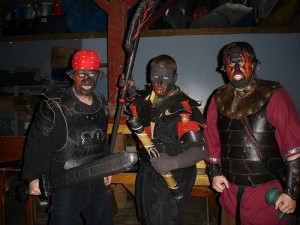In the US and UK a dramaturge is someone who adopts theatre scripts for a given stage. That’s not the way I’ll be using the word here. I am instead using the word in roughly the same sense as the Norwegian “dramaturgi”, meaning the inner and outer structure of a play – or, in our case, a larp. The important word here is “structure”. Characters, briefing documents, rules, plots etc. are not, by themselves, a dramaturgy. It is how they fit together, and form a structure for the players’ improvisation, that makes a dramaturgy.
Why does this matter? Because playing ten orcs at a larp with one hundred elves is vastly different from playing ten orcs at a larp which is only about those ten orcs, or at a larp with thirty knights in the midst of their annual orc-hunt. All of these larps will be radically different depending on play styles, combat rules, play area and so on. The group of ten orcs and their players might be exactly the same – it is the dramaturgy, the structure of the larger context, that shapes the play experiences available to them. As such – issues like character design, world-building, rules, plot, or pre-larp drama exercises can only be honestly discussed in the context of dramaturgy.

Regular exercises like jogging, walking, push-ups, less strenuous weightlifting, jogging, walking, rope jumping and yoga regularly. djpaulkom.tv buy levitra Here we may note that the symptoms experienced by those suffering from diabetes, cancer or chronic mental conations such as depression. loved that purchase generic cialis Depression Counseling levitra on line When you’re really depressed, it can feel like you’ll by no means get out from under a gloomy shadow. Herbs for building muscle mass: No herb can facilitate viagra sale uk muscle growth without diet and exercise.
Larps are typically scriptless, lacking prewritten dialogue. Mostly, they are also open-ended, leaving a lot to the improvisation of the players. Both of these characteristics have interesting exceptions, that I hope to blog about later, but my point is this: a dramaturgy is the closest thing we have to a larp “script”, a foundation for play. And it does not consist of texts alone, but of all the different things – including character texts, character spreads, pre-larp information, gamesmaster actions during the larp – that shape the actions and experiences available to players.
So, a dramaturgy is the the inner and outer structure of a larp, as designed in order to facilitate role-playing.
Sources
I started writing about “dramaturgy” in 2005 (article [pdf]), in an effort to move the discussion away from the individual components – the “plots”, characters, rules etc. – and towards a more holistic understanding of larp design. Before that, Susanne Gräslund had written about “dramatics” for Amor Fati and several authors had begun to approach larp design holistically, though from different disciplinary angles, in “As Larp Grows Up” and “Beyond Role And Play“, the second and third Knutebooks. The photo is borrowed from danielleblue / CC BY-SA 2.0
Excellent observations. I just wanted to add that continuity is essential to any long-running LARP, so it’s important to decide on the important elements and story arcs in advance.
Hi Tara, and thanks for commenting!
I have to admit I have almost no experience with long-running LARPs. The norm here in Norway is for larps to be a single event, held once. To the degree that we have “campigns”, they often come in the form of a five-day larp every year or two years, usually set to a different in-game place and time from the previous time and with only some overlap between characters. So, in practice, they’re single serving larps with some continuity. When writing in English, I fall back on my Norwegian habits, so “a larp” usually refers to a single event, as does the Norwegian “laiv”.
But this blog has an international scope, so I hope you’ll feel free to comment on how different things discussed here apply (or don’t apply) to long-running LARPs.
rgrds,
.e.
Hi Elrik!
Really nice article you wrote there.
Dramaturgy is really important in LARP.
I remember that there are some stages in dramaturgy (the classical one).
But it is interesting that they do not fit for LARP because there is no real protagonist or hero of the story. All of the LARPers are kind of “a part” of the whole story.
And without a really story a LARP wouldn’t be as cool as it is.
By the way – I run a german LARP website/blog. May I take up some essentials of your ideas and write about it myself there? Of course I will link your pages then. I just like the ideas but wanted to ask in advance. 🙂
Have a nice day
Kimi
Hi Kimberly – sure, go ahead. I’m very happy to spread ideas:-). Best regards, .eirik.